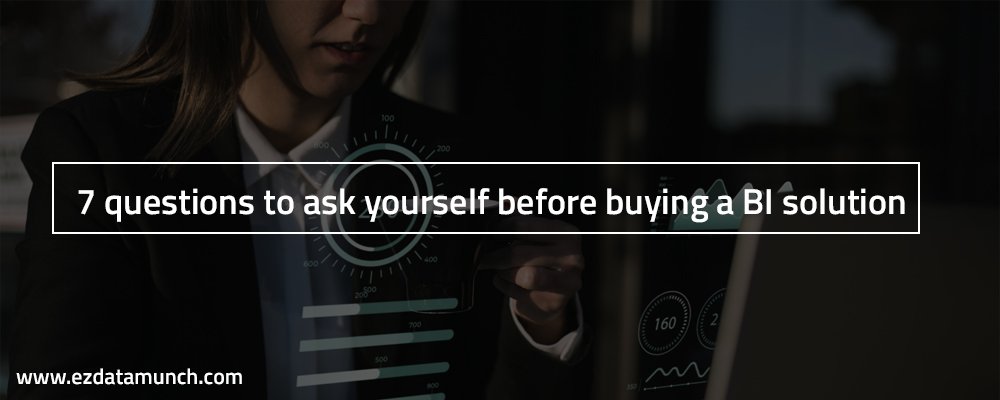Every industry is unique and has its own share of complexities and challenges. Their customers are unique, they have different marketing methods, they have different services and products, and different budgets and goals. Thus the data being generated by every industry is unique. This data consists of the jewels of information about various business processes and customers and is available in abundance in every sector. We live in the era of petabytes and Exabytes of data and enormous amounts of data are created every day. It is not rocket science to understand that a company’s success is highly dependent on the appropriate utilization of the data they have. A smart business intelligence solution that can quickly transform volumes of data into easily understandable graphical charts in real-time is always a good investment. Successful companies are already using such smart solutions and many other companies have joined this bandwagon. The issue is how to select a smart solution. The decision to buy a smart business intelligence solution highly depends on the limited budget and the company’s goals and vision. As you start looking for the best business intelligence solution, you will be barged with various confusing terms that include data analytics, data mining, predictive modeling, clustering, and visualization. So to reap value out of this effort, you must first know what you want. It can be a whole package that encompasses all of the above-mentioned terms or just parts of it depending on your company’s need. Below are the 7 important questions you should ask before selecting a business intelligence solution.

1) What kind of data do I have and what do I want to analyze?
These seem to be two different questions however they need to be answered as one because without answering one your business intelligence project can fail. It’s a good practice to do data profiling before starting the BI project. It is advisable to have data cleaned and arranged as any shortfall in data can lead to incorrect information thus jeopardizing the whole BI effort. A smart business intelligence solution can help in improved sales and marketing efforts. Also, it can be used to identify cost-cutting opportunities and forecast costs and profits. For this to materialize, a company should have the appropriate data and a clear idea of what they want out of their business intelligence project.
2) Who are the users of the Business Intelligence solution in my company? Technical or non-technical?
The business intelligence industry is swiftly moving towards self-service BI. Companies are more inclined to put business owners in charge of data rather than having an IT person handle it for them as this mode of working provides autonomy and ensures quick actions in any situation. Over the past couple of years, many BI companies have put non-technical users in charge of BI solutions and enabled them to create and access BI reports, queries, and analytics themselves without the need for IT resources.
3) If only Dashboard, then do I need a pre-built application playbook or do I need to build one from scratch?
Pre-built application playbooks are made differently for every industry keeping in mind their specific needs in terms of metrics and KPIs. These are off-the-shelf products that are ready to use and require 60% less time to be deployed compared to building a dashboard from scratch. Also, it’s pretty easy to add additional dashboards on a pre-built dashboard environment. However pre-built applications have their limitations, as they may not be able to cover all the KPIs. In such cases, it’s advisable to have a solution built from scratch to fit the company’s requirements. Companies such as QlikView, EzDataMunch, Domo, and Tableau are pioneers in providing pre-built applications and customized dashboards.
4) Should I go with a cloud solution or an on-premise solution?
Cloud computing is the buzzword in every CIO meeting as more and more companies are opting for cloud-based services so how can BI stay away from this clot? There are significant distinctions between the Cloud cloud-based model and on on-premise licensing model. The very common and most important distinctions are that cloud BI solution takes less time to implement, is highly scalable, cost-effective, and can be accessed from anywhere in the world by just logging in to the web portal which is one of the most important features that enables quick decision making. Whereas on-premise license-based solution involves high upfront costs for infrastructure and then yearly maintenance also the implementation period can take a lot of time and money. It entirely depends on a company’s perspective of what suits them best.
5) Do I need a whole BI stack or a Dashboard tool will work for me?
Business intelligence solution has multiple categories. Many solutions come in the form of a completely built BI platform offering Data integration, data storage, data modeling, and even mobile application development tools. Your company may not need all of them, as you must have having few of them in place already so all you may need is a comprehensive and easily customizable presentation layer like a dashboard or reporting tool. Many companies specialize in providing dashboard tools. It all depends on the kind of value you see in this investment, your perception of the solution, and your goals.
6) Should I be using Big Data?
Top big data sources are: Hadoop Map Reduce application results, Public data, Social influencers, Social network profiles, Cloud applications, Activity-generated data, Data warehouse appliances, Network and in-stream monitoring technologies, and legacy data. A company may not be having all of these sources however there are some nuggets in the pile and any data is good data thus Big Data should not be discounted.
7) What size of company do I need to work with?
The answer to this question largely depends on the company’s vision and budget. It is said that 50 to 70 % of the IT budget is spent on maintaining existing technology platforms. This leaves very little room in any company to go for heavy investment, however, there are many vendors out there ranging from large conglomerates to small vendors. There are also young, small, and aggressive companies with fresh perspectives that might bring new mindsets to the table.
FAQ’s
What are my specific business goals and objectives?
Before investing in a BI solution, it’s crucial to identify your business objectives. Are you aiming to improve sales performance, optimize operations, or enhance customer satisfaction? Understanding your goals will help you select a BI solution tailored to your needs.
What data sources do I need to integrate with the BI solution?
Different BI solutions offer varying degrees of compatibility with data sources. Whether you need to integrate data from spreadsheets, databases, or cloud applications, ensure that the BI solution supports your data sources to maximize its effectiveness.
What level of data visualization and reporting capabilities do I require?
Consider the level of data visualization and reporting functionalities your organization needs. Do you require interactive dashboards, customizable reports, or advanced analytics features? Assessing your visualization and reporting requirements will guide you in selecting the most suitable BI solution.
How user-friendly is the BI solution for non-technical users?
Ease of use is essential, especially if your organization has non-technical users who will interact with the BI solution regularly. Look for a BI solution with an intuitive interface and self-service capabilities to empower users across your organization to access and analyze data independently.
What is the scalability and flexibility of the BI solution?
Consider the scalability and flexibility of the BI solution to accommodate future growth and evolving business needs. Can the solution handle increasing data volumes and support additional users? Ensure that the BI solution aligns with your organization’s long-term scalability requirements.

Milan Desai as a Chief Technology Officer has more than 20 years of industry experience in working with clients to solve business problems. Passionate about leveraging technology for improving the quality of life and optimize the use of resources. Currently, working on utilizing data to drive business decision making process and user understanding of key metrics that drive the organization and markets in general. Chief Technology Officer of EzDataMunch – the first BI Apps store in the world.

